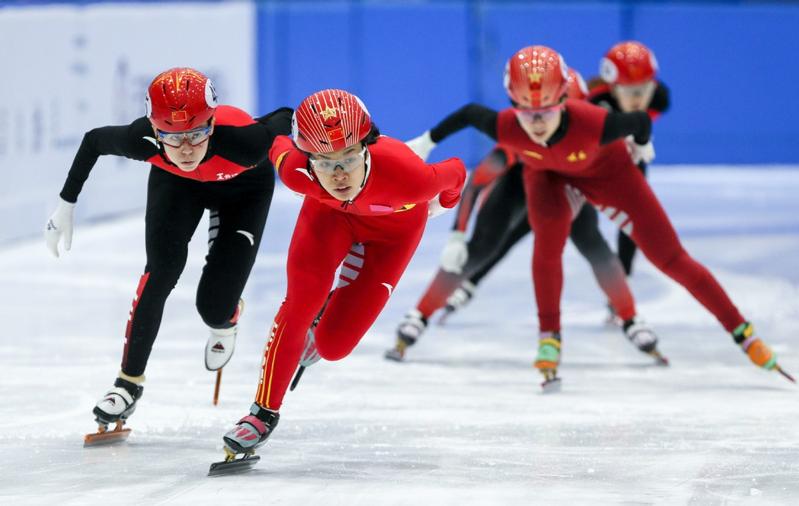 A downhill racer speeds down the slope at the Changchengling ski resort in the Chongli district of Zhangjiakou, Hebei province, where athletes are honing their preparations for the 2022 Winter Olympics. (WEI XIAOHAO / CHINA DAILY)
A downhill racer speeds down the slope at the Changchengling ski resort in the Chongli district of Zhangjiakou, Hebei province, where athletes are honing their preparations for the 2022 Winter Olympics. (WEI XIAOHAO / CHINA DAILY)
The COVID-19 pandemic rocked the sports world to its core this year, but failed to shake the resolve and determination of Chinese athletes preparing for their home Winter Olympics.
China's figure skating team has been training behind closed doors since the cancelation of March's ISU World Championships in Seoul
Ever since Beijing and Zhangjiakou were announced as the host cities of the 2022 Games on July 31,2015, China has been working tirelessly toward full participation in the 109 events and has targeted the country's best-ever medal haul at the Games.
Now, with the Games nearing their 400-day countdown, an elite pool of 1,153 athletes-whittled down from an initial 4,000-are approaching the final sprint in their preparations, continuing to embrace the challenges that the pandemic-altered world throws their way.
ALSO READ: 500-day countdown to 2022 Winter Olympics celebrated
Tailored training
In March, all Chinese winter sports teams called a premature end to their mission of training and competing abroad in the interests of their health and safety.
Instead, the Chinese Olympic Committee has implemented a tailor-made approach to training.
Teams already training at home remained where they were, while those affected by closures at ski resorts moved to the national snow sports training base in Chengde, Hebei province.
Before the pandemic began to decimate the sporting calendar, Chinese athletes had achieved some encouraging results at international meets in speed skating, figure skating, snowboard, freeski and slopestyle.
There were also some notable breakthroughs, with naturalized teenage sensation Gu Ailing (aka Eileen Gu) becoming the first freestyle skier to win the halfpipe and slopestyle competitions on consecutive days at an International Ski Federation World Cup meet in Calgary, Canada, in February.
After the conclusion of the 2019-20 season, Chinese teams began isolated training, with some staging internal competitions.
For example, when South Korea was unable to stage the World Short-Track Speed Skating Championships in March, the Chinese team instead hosted a test event at their training base to gauge athletes' progress.
Fitness first
The Winter Sports Administrative Center has kept teams operating in a streamlined fashion, strictly enforcing regulations in regards to fitness, anti-doping, fiscal matters, and foreign affairs management.
Passing a fitness test was a prerequisite for all athletes before joining a team. Each athlete was assigned specific requirements based on his or her performance and was given two chances to pass the test.
In July, 30 teams conducted fitness tests at 12 venues across the country via video link.
The anti-doping measures stipulated that teams could not be established without providing information concerning the backgrounds of athletes and support staff.
In addition, teams had to sign anti-doping protocols, specify anti-doping duties, and conduct medical inspections and take certain precautions when training abroad.
To reinforce ties with winter sports governing bodies, the Winter Sports Administrative Center held video conferences with the World Curling Federation, the International Luge Federation, and the International Skating Union in August. Topics discussed included Beijing 2022 preparations, the event calendar and the sustainable development of winter sports in China.
 In this undated photo, China's elite short-track speed skaters battle it out at the national championships in Tianjin. (PHOTO / OSPORTS)
In this undated photo, China's elite short-track speed skaters battle it out at the national championships in Tianjin. (PHOTO / OSPORTS)
Testing times
China's figure skating team has been training behind closed doors since the cancelation of March's ISU World Championships in Seoul.
As the first international event held in China since the outbreak of COVID-19, the ISU Grand Prix Cup of China was held in Chongqing in November. The competition was limited to domestic athletes because of travel restrictions, with the Chinese skaters thrilled to have the chance to compete again.
"I think some of our skaters have made big progress," said head coach Zhao Hongbo. "Our preparations for the 2022 Olympic Games are on pace. Although the pandemic forced us to change some training and competition plans, it didn't have much impact on our preparations."
Two-time men's world bronze medalist Jin Boyang debuted two new routines at the event and won the title with 290.89 points.
"Jin made a big improvement in his physical fitness. He trained hard in Sanya, and now he jumps much higher and more steadily," Zhao said.
Two-time pairs world champions Sui Wenjing and Han Cong missed the competition as Han continues his recovery from hip surgery. Sui, though, said the duo remains cautiously optimistic about their 2022 build-up.
"Higher and further is our goal," said Sui. "We need to improve the quality of our moves. What matters more, though, is to stay injury-free to make it to the Olympics."
READ MORE: Impressive approach paves way for Winter Olympics
To test the effect of fitness training, a scrimmage was held for Chinese teams across eight events, including curling, freestyle aerials, and freestyle moguls in October.
Following her strong performance at the end of last season, US-born Gu kicked off her 2020-21 World Cup campaign with a third-place finish in Stubai, Austria, in November.
Gu's 2022 preparations were also boosted by her academic achievements. The 17-year-old was recently offered a place at Stanford University, allowing her to finish her high-school studies a year ahead of schedule.


